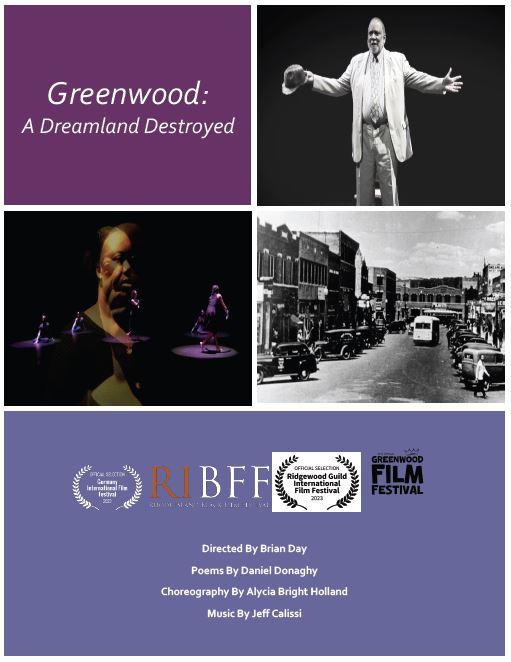- Apply
- Visit
- Request Info
- Give
Eastern documentary on Tulsa Race Massacre well received at film festivals
Written by Elisabeth Craig
Published on September 08, 2023
 A documentary film directed by Eastern Connecticut State University theatre Professor Brian Day about the Tulsa race massacre of 1921 captured attention at several film festivals this summer.
A documentary film directed by Eastern Connecticut State University theatre Professor Brian Day about the Tulsa race massacre of 1921 captured attention at several film festivals this summer.
"Greenwood: A Dreamland Destroyed” was named “Best Featured Documentary” at the Indianapolis Black Documentary Film Festival and received honorable mention abroad at the Germany International Film Festival.
It was also well received at the Rhode Island Black Film Festival, the Ridgewood Guild International Film Festival and the Greenwood Film Festival, according to Day.
Like the original stage production at Eastern, “The Greenwood Project: Against Erasure,” the documentary combined film, poetry and choreography. Working alongside Day were Professors Daniel Donaghy (English), Jeffrey Calissi (music) and Alycia Bright-Holland (theatre). Day filmed the production following its live stage run and turned it into a stand-alone documentary.
The film, “Greenwood: A Dreamland Destroyed,” depicts the loss of life and damage to African American culture during the 1921 race massacre, in which a horde of white supremacists destroyed the Greenwood neighborhood of Tulsa, OK. The production also celebrates the achievements of African Americans in the early 20th century and is an exploration of the racially motivated censorship of these accomplishments.

Erasure is a powerful theme in this film, and Professor Day elucidated on the long-term effects of the racial bias against Black History and how it plays a part in his film: “The fact that erasure has been a common practice since the settlers arrived from Europe is something that needs to be widely addressed,” said Day.
“This erasure is not just a practice of erasing truth but creating a false belief of superiority and domination of one group because the truth has been hidden from the masses. Greenwood was a way to get audiences to think about a horrific racist violent act that did occur but had been erased from history. There are significant consequences from erasure.
“I felt the film was about an important part of history that has mostly been ignored or erased. I hoped people would appreciate it. I was pleasantly surprised to get the positive reception and to have the film appreciated in so many different regions,” said Day, who is currently looking to have the film distributed toward an educational marketplace.


